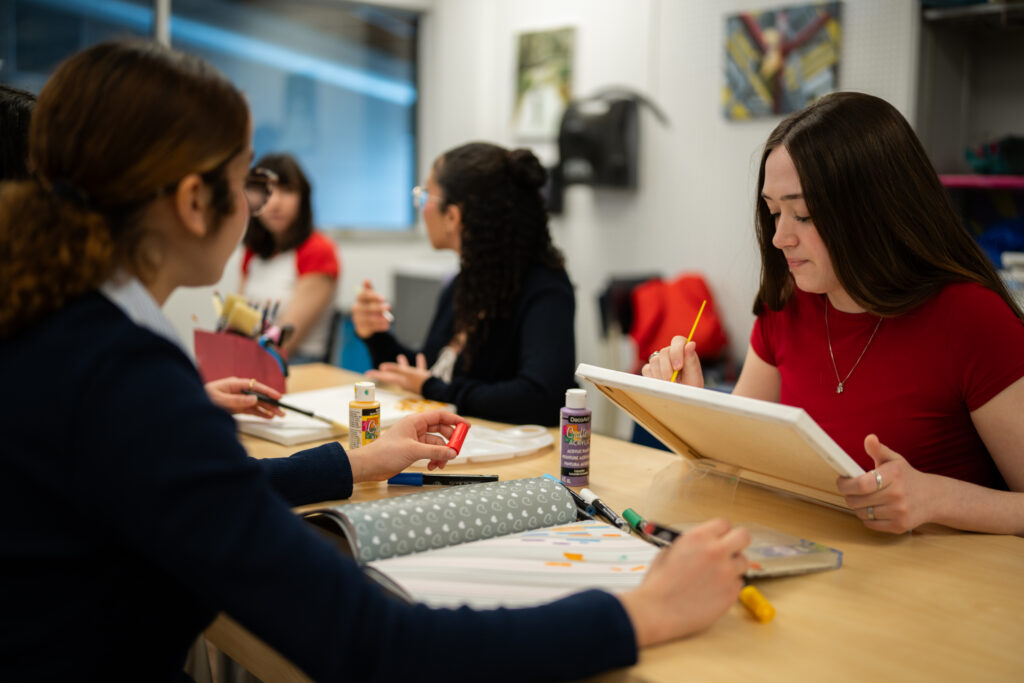500. AE - Pre-University
Arts, Literature & Communication
The Arts, Literature, and Communication (ALC) program is designed for creative and curious students who are passionate about culture, expression, and media.
Admission
- Fall
Duration
- 2 years
Interests
- Arts & Literature
- Languages
- Communications
- Culture
Requirements
- College general admission requirements
What You Can Expect from the Program
In the Arts, Literature, and Communication program, you’ll master written and spoken English and French, gain insight into cultural issues from both linguistic perspectives, and improve your proficiency in Spanish. Additionally, through courses focused on creativity and expression, you’ll build confidence in public speaking, refine your academic research skills, and strengthen your critical thinking by exploring Western culture and popular fiction.
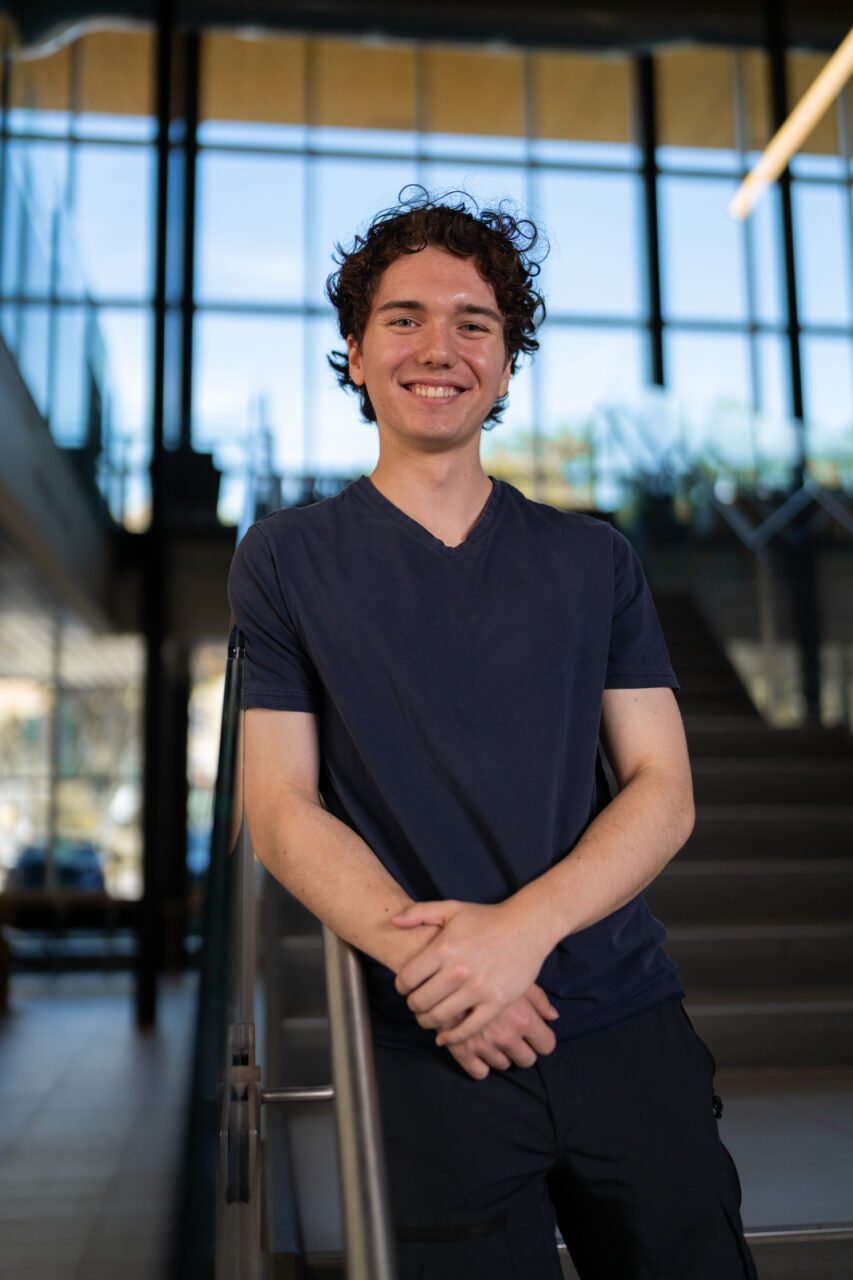
Inspiring Ideas Through Culture, Creation and Expression
Learn in French, English, and Spanish
Develop the multilingual communication skills that will make you stand out in any field.
Study in a UNESCO City of Literature
Quebec is the first French-speaking city to earn the title of UNESCO City of Literature, a testament to its rich literary culture. This distinction reflects the city’s vibrant network of libraries, the renowned Maison de la littérature, and its thriving community of writers, publishers, and booksellers.
Explore National and Cultural Issues Using a Bilingual Lens
Given its position at the crossroads of English and French cultural influences, St. Lawrence covers national cultural issues in two courses: Canadian Arts and Literature and Le Québec à travers son art. This allows you to explore two perspectives of the crucial issue of identity at the same time.
3
Languages of study
24
Hours of class per semester, maximum
93.8%
Of students get into their first choice of university program
Take the Lead in Your Studies
During the course of your studies, you will have the opportunity to study in English, French, and Spanish. Your specific course sequence is determined by your Certificate status and your prior knowledge of Spanish.
If you are eligible to attend English school under the Charter of the French language and are in possession of a certificate granted by the Ministry of Education, you are considered a Certificate Holder. Your course sequence will then be determined by your results in the high school French course (1-2 or 3-4). For more information about Certificates, please consult the Ministry of Education’s website. If you are not eligible, you must follow the course sequence for Non Certificate Holders that prepares students for l’Épreuve uniforme de français (EUF – French ministerial language evaluation).
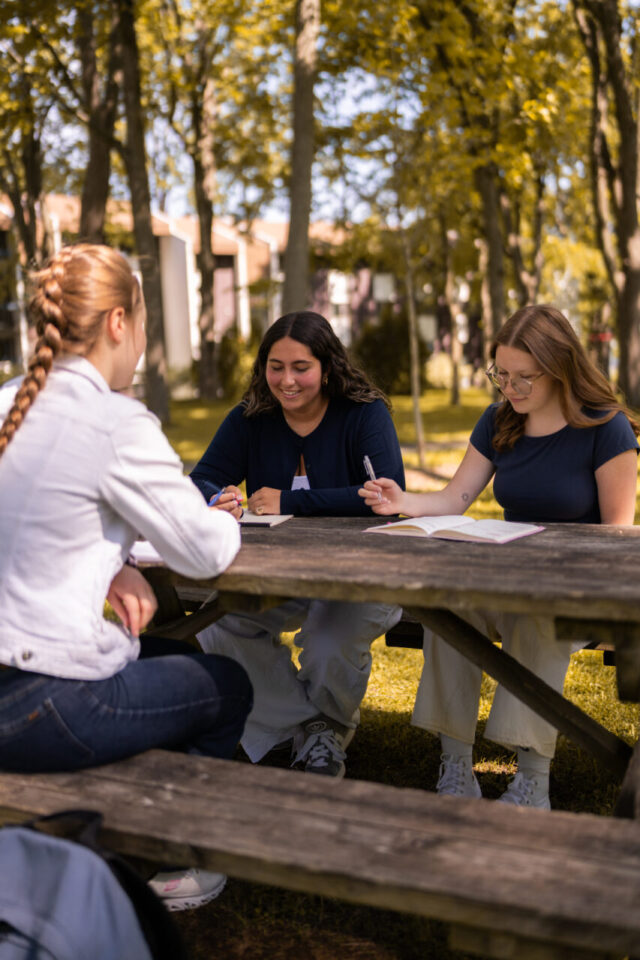
L1 – No Prior Spanish
This sequence takes you through college-level courses I, II and III in Spanish.
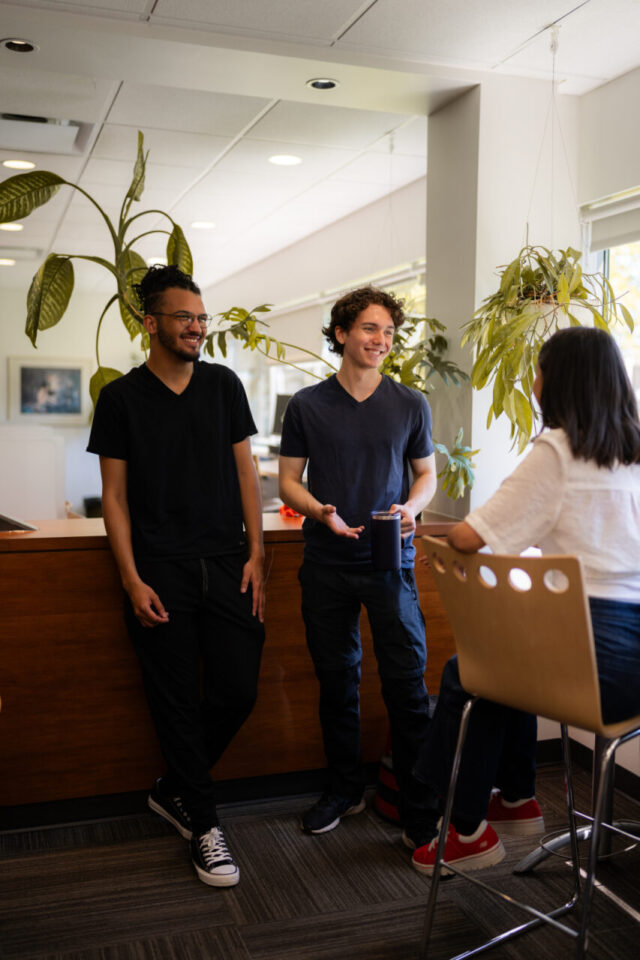
L2 – Prior Spanish
This sequence takes you through college-level courses II, III and IV in Spanish.
Language Equivalency Procedure (Spanish)
Students with prior knowledge of Spanish may request a course equivalency for a fee of $25.
Steps:
- Submit the Request for Equivalency Form and $25 payment to admissionslc@crcmail.net. A placement test will be sent to you.
- Based on your results, you may be invited to complete an additional test during the Welcome Days.
- Once the College has your results, they will be transmitted to you, and you will be placed in the appropriate level. You will be given credit for the prior courses.
- If you have any questions, please contact the Academic Advisor.
This sequence takes you through college-level courses I, II and III in Spanish.
Courses for Students Without Prior Spanish Knowledge
Your specific course sequence is determined by your Certificate status.
Course sequence legend :
(Theory – Laboratory – Personal Work)
- Theory (T): Hours in class per week
- Laboratory (L): Hours of laboratory or internship per week
- Personal Work (P): Estimated personal work hours outside of class
- Total contact hours per week: Hours in class (Theory + Laboratory) for the semester
603-101-MQ
2-2-4
Introduction to College English
603-710-LW
2-2-3
Modes of Expression
By the end of this course, students will become familiar with the language and techniques specific to various modes of artistic and literary expression. In so doing, students will develop a thorough grasp of the methods of analysis and documentation pertaining to multiple forms of artistic expression.
603-610-LW
2-2-4
Introduction to Creation
In this course, students will become familiar with the language used in the study of the arts, culture, and the creative process by exploring specific elements from various works of literature. They will learn to express their creativity by carrying out practical projects through which they will acquire a mastery of the tools and models used in the expression of one’s creativity.
602-110-LW
2-2-3
Le Québec à travers son art
Par l’application de différentes approches analytiques et l’étude de genres et de modes artistiques variés, les étudiant.e.s s’intéresseront à l’histoire du Québec et s’interrogeront sur l’évolution de la société au Québec au gré des époques et des différents milieux de vie. Au fil de leurs analyses, les étudiant.e.s pourront affiner leur regard sur le passé artistique et les développements actuels.
603-610-LW
2-1-3
Spanish I
During and upon completion of this course students will be able to understand simple oral and written messages in Spanish and communicate orally and in writing in a number of basic everyday situations. They will be introduced to the culture and history of Spanish-speaking countries.
602-UF0-MQ
2-1-3
Oeuvres narratives et écriture
Total 22h / week
603-103-MQ
2-2-3
Literary Themes in Poetry
345-101-MQ
3-1-3
Knowledge
109-101-MQ
1-1-1
Physical Activity and Health
603-810-LW
2-2-3
Evolving Expressions
The objective of this course is to take students on a historical journey and trace the evolution of a specific mode of expression in time and the artistic currents that have punctuated its development. Students will then apply the knowledge acquired in the course to the production of a creative project.
602-120-LW
1-2-3
On sort: parcours culturels
Ce cours vise à offrir aux étudiant.e.s des occasions de découvertes artistiques dans un cadre analytique défini pour leur permettre de porter un jugement critique pertinent et personnel. Que ce soit par des visites au théâtre, par l’écoute de concerts, par la visite d’un musée ou par la participation à des événements multidisciplinaires, les étudiant.e.s seront invité.e.s à comprendre l’écosystème des différents milieux artistiques de la ville de Québec.
603-610-LW
2-1-3
Spanish II
During and upon completion of this course students will be able to understand more complex oral and written messages in Spanish compared to Spanish 1. They will also communicate orally and in writing in an additional number of basic everyday situations and demonstrate familiarity with fundamental aspects of the culture and history of Spanish-speaking countries.
602-UF1-MQ
2-1-3
Poésie, théâtre et écriture
Total 23h / week
603-102-MQ
2-2-3
Literary Genres
345-102-MQ
3-0-3
World Views
109-102-MQ
0-2-1
Physical Activity & Effectiveness
603-210-LW
2-1-3
Canadian Arts and Literature
This course is an exploration of Canadian cultural expression through the study of Canadian literature and associated arts. Students will explore and examine the relationship between works of Canadian fiction, cultural institutions and the creative process.
603-310-LW
2-2-3
Perspectives in English Literature
Students will learn to identify and apply different critical perspectives to works of literature and discover how such theories lead to contrasting views of the human condition.
607-310-LW
2-1-3
Spanish III
During and upon completion of this course, students will learn the structures and vocabulary needed to understand and communicate orally and in writing with some circumlocutions on most subjects relevant to everyday life. They will also interact spontaneously and meaningfully in Spanish to talk and discuss on topics related to the history and culture of Spanish-Speaking countries.
602-UF2-MQ
2-1-3
Comparaison d’oeuvres littéraires
Total 22h / week
603-BNR-LW
2-2-2
Long Fiction
345-BNR-LW
3-0-3
Ethics
109-103-MQ
1-1-1
Physical Activity & Autonomy
502-411-LW
2-2-4
Exploring Cultural Diversity
This course will enable students to compare aspects of contemporary culture between the local Canadian and Québec context and the context of countries associated with one of the foreign languages studied in the program (Spanish). Themes and issues will be approached in Spanish with the help of examples from the arts, short literary texts and coverage in the media.
603-550-LW
2-2-4
Pop Fiction
In a variety of works and genres, students will explore the fascinating world of Pop Fiction, the themes and media used for its expression, and the meaning and purpose of Pop Fiction in the postmodern age.
602-130-LW
2-2-4
Projet créatif
Dans le cadre de ce cours, les étudiant.e.s seront initié.e.s à différentes approches créatives, en littérature, en poésie, en théâtre, etc., en vue de la création d’un projet personnel, de son élaboration à la production finale. Afin de bien s’inscrire dans leur milieu culturel, les étudiant.e.s devront s’appuyer sur leurs connaissances pour justifier les choix artistiques qu’ils et elles auront voulu mettre en œuvre.
Complementary
2-1-3
Complementary course
Total 24h / week
603-101-MQ
2-2-4
Introduction to College English
603-710-LW
2-2-3
Modes of Expression
By the end of this course, students will become familiar with the language and techniques specific to various modes of artistic and literary expression. In so doing, students will develop a thorough grasp of the methods of analysis and documentation pertaining to multiple forms of artistic expression.
603-610-LW
2-2-4
Introduction to Creation
In this course, students will become familiar with the language used in the study of the arts, culture, and the creative process by exploring specific elements from various works of literature. They will learn to express their creativity by carrying out practical projects through which they will acquire a mastery of the tools and models used in the expression of one’s creativity.
602-110-LW
2-2-3
Le Québec à travers son art
Par l’application de différentes approches analytiques et l’étude de genres et de modes artistiques variés, les étudiant.e.s s’intéresseront à l’histoire du Québec et s’interrogeront sur l’évolution de la société au Québec au gré des époques et des différents milieux de vie. Au fil de leurs analyses, les étudiant.e.s pourront affiner leur regard sur le passé artistique et les développements actuels.
603-610-LW
2-1-3
Spanish I
During and upon completion of this course students will be able to understand simple oral and written messages in Spanish and communicate orally and in writing in a number of basic everyday situations. They will be introduced to the culture and history of Spanish-speaking countries.
602-10X-MQ
2-1-3
Français Bloc A
Total 22h / week
603-103-MQ
2-2-3
Literary Themes in Poetry
345-101-MQ
3-1-3
Knowledge
109-101-MQ
1-1-1
Physical Activity and Health
603-810-LW
2-2-3
Evolving Expressions
The objective of this course is to take students on a historical journey and trace the evolution of a specific mode of expression in time and the artistic currents that have punctuated its development. Students will then apply the knowledge acquired in the course to the production of a creative project.
602-120-LW
1-2-3
On sort: parcours culturels
Ce cours vise à offrir aux étudiant.e.s des occasions de découvertes artistiques dans un cadre analytique défini pour leur permettre de porter un jugement critique pertinent et personnel. Que ce soit par des visites au théâtre, par l’écoute de concerts, par la visite d’un musée ou par la participation à des événements multidisciplinaires, les étudiant.e.s seront invité.e.s à comprendre l’écosystème des différents milieux artistiques de la ville de Québec.
603-610-LW
2-1-3
Spanish II
During and upon completion of this course students will be able to understand more complex oral and written messages in Spanish compared to Spanish 1. They will also communicate orally and in writing in an additional number of basic everyday situations and demonstrate familiarity with fundamental aspects of the culture and history of Spanish-speaking countries.
602-BNY-MQ
2-1-3
Français Bloc B
Total 23h / week
603-102-MQ
2-2-3
Literary Genres
345-102-MQ
3-0-3
World Views
109-102-MQ
0-2-1
Physical Activity & Effectiveness
603-210-LW
2-1-3
Canadian Arts and Literature
This course is an exploration of Canadian cultural expression through the study of Canadian literature and associated arts. Students will explore and examine the relationship between works of Canadian fiction, cultural institutions and the creative process.
603-310-LW
2-2-3
Perspectives in English Literature
Students will learn to identify and apply different critical perspectives to works of literature and discover how such theories lead to contrasting views of the human condition.
607-310-LW
2-1-3
Spanish III
During and upon completion of this course, students will learn the structures and vocabulary needed to understand and communicate orally and in writing with some circumlocutions on most subjects relevant to everyday life. They will also interact spontaneously and meaningfully in Spanish to talk and discuss on topics related to the history and culture of Spanish-Speaking countries.
Complementary
2-1-3
Complementary course
Total 22h / week
603-BNR-LW
2-2-2
Long Fiction
345-BNR-LW
3-0-3
Ethics
109-103-MQ
1-1-1
Physical Activity & Autonomy
502-411-LW
2-2-4
Exploring Cultural Diversity
This course will enable students to compare aspects of contemporary culture between the local Canadian and Québec context and the context of countries associated with one of the foreign languages studied in the program (Spanish). Themes and issues will be approached in Spanish with the help of examples from the arts, short literary texts and coverage in the media.
603-550-LW
2-2-4
Pop Fiction
In a variety of works and genres, students will explore the fascinating world of Pop Fiction, the themes and media used for its expression, and the meaning and purpose of Pop Fiction in the postmodern age.
602-130-LW
2-2-4
Projet créatif
Dans le cadre de ce cours, les étudiant.e.s seront initié.e.s à différentes approches créatives, en littérature, en poésie, en théâtre, etc., en vue de la création d’un projet personnel, de son élaboration à la production finale. Afin de bien s’inscrire dans leur milieu culturel, les étudiant.e.s devront s’appuyer sur leurs connaissances pour justifier les choix artistiques qu’ils et elles auront voulu mettre en œuvre.
Complementary
2-1-3
Complementary course
Total 24h / week
603-101-MQ
2-2-4
Introduction to College English
603-710-LW
2-2-3
Modes of Expression
By the end of this course, students will become familiar with the language and techniques specific to various modes of artistic and literary expression. In so doing, students will develop a thorough grasp of the methods of analysis and documentation pertaining to multiple forms of artistic expression.
603-610-LW
2-2-4
Introduction to Creation
In this course, students will become familiar with the language used in the study of the arts, culture, and the creative process by exploring specific elements from various works of literature. They will learn to express their creativity by carrying out practical projects through which they will acquire a mastery of the tools and models used in the expression of one’s creativity.
602-110-LW
2-2-3
Le Québec à travers son art
Par l’application de différentes approches analytiques et l’étude de genres et de modes artistiques variés, les étudiant.e.s s’intéresseront à l’histoire du Québec et s’interrogeront sur l’évolution de la société au Québec au gré des époques et des différents milieux de vie. Au fil de leurs analyses, les étudiant.e.s pourront affiner leur regard sur le passé artistique et les développements actuels.
603-610-LW
2-1-3
Spanish I
During and upon completion of this course students will be able to understand simple oral and written messages in Spanish and communicate orally and in writing in a number of basic everyday situations. They will be introduced to the culture and history of Spanish-speaking countries.
602-10X-MQ
2-1-3
Français Bloc A
Total 22h / week
603-103-MQ
2-2-3
Literary Themes in Poetry
345-101-MQ
3-1-3
Knowledge
109-101-MQ
1-1-1
Physical Activity and Health
603-810-LW
2-2-3
Evolving Expressions
The objective of this course is to take students on a historical journey and trace the evolution of a specific mode of expression in time and the artistic currents that have punctuated its development. Students will then apply the knowledge acquired in the course to the production of a creative project.
602-120-LW
1-2-3
On sort: parcours culturels
Ce cours vise à offrir aux étudiant.e.s des occasions de découvertes artistiques dans un cadre analytique défini pour leur permettre de porter un jugement critique pertinent et personnel. Que ce soit par des visites au théâtre, par l’écoute de concerts, par la visite d’un musée ou par la participation à des événements multidisciplinaires, les étudiant.e.s seront invité.e.s à comprendre l’écosystème des différents milieux artistiques de la ville de Québec.
603-610-LW
2-1-3
Spanish II
During and upon completion of this course students will be able to understand more complex oral and written messages in Spanish compared to Spanish 1. They will also communicate orally and in writing in an additional number of basic everyday situations and demonstrate familiarity with fundamental aspects of the culture and history of Spanish-speaking countries.
602-BNY-MQ
2-1-3
Français Bloc B
Total 23h / week
603-102-MQ
2-2-3
Literary Genres
345-102-MQ
3-0-3
World Views
109-102-MQ
0-2-1
Physical Activity & Effectiveness
603-210-LW
2-1-3
Canadian Arts and Literature
This course is an exploration of Canadian cultural expression through the study of Canadian literature and associated arts. Students will explore and examine the relationship between works of Canadian fiction, cultural institutions and the creative process.
603-310-LW
2-2-3
Perspectives in English Literature
Students will learn to identify and apply different critical perspectives to works of literature and discover how such theories lead to contrasting views of the human condition.
607-310-LW
2-1-3
Spanish III
During and upon completion of this course, students will learn the structures and vocabulary needed to understand and communicate orally and in writing with some circumlocutions on most subjects relevant to everyday life. They will also interact spontaneously and meaningfully in Spanish to talk and discuss on topics related to the history and culture of Spanish-Speaking countries.
Complementary
2-1-3
Complementary course
Total 22h / week
603-BNR-LW
2-2-2
Long Fiction
345-BNR-LW
3-0-3
Ethics
109-103-MQ
1-1-1
Physical Activity & Autonomy
502-411-LW
2-2-4
Exploring Cultural Diversity
This course will enable students to compare aspects of contemporary culture between the local Canadian and Québec context and the context of countries associated with one of the foreign languages studied in the program (Spanish). Themes and issues will be approached in Spanish with the help of examples from the arts, short literary texts and coverage in the media.
603-550-LW
2-2-4
Pop Fiction
In a variety of works and genres, students will explore the fascinating world of Pop Fiction, the themes and media used for its expression, and the meaning and purpose of Pop Fiction in the postmodern age.
602-130-LW
2-2-4
Projet créatif
Dans le cadre de ce cours, les étudiant.e.s seront initié.e.s à différentes approches créatives, en littérature, en poésie, en théâtre, etc., en vue de la création d’un projet personnel, de son élaboration à la production finale. Afin de bien s’inscrire dans leur milieu culturel, les étudiant.e.s devront s’appuyer sur leurs connaissances pour justifier les choix artistiques qu’ils et elles auront voulu mettre en œuvre.
Complementary
2-1-3
Complementary course
Total 24h / week
Courses for Students With Prior Spanish Knowledge
Your specific course sequence is determined by your Certificate status.
603-101-MQ
2-2-4
Introduction to College English
345-101-MQ
3-1-3
Knowledge
603-710-LW
2-2-3
Modes of Expression
By the end of this course, students will become familiar with the language and techniques specific to various modes of artistic and literary expression. In so doing, students will develop a thorough grasp of the methods of analysis and documentation pertaining to multiple forms of artistic expression.
603-610-LW
2-2-4
Introduction to Creation
In this course, students will become familiar with the language used in the study of the arts, culture, and the creative process by exploring specific elements from various works of literature. They will learn to express their creativity by carrying out practical projects through which they will acquire a mastery of the tools and models used in the expression of one’s creativity.
602-110-LW
2-2-3
Le Québec à travers son art
Par l’application de différentes approches analytiques et l’étude de genres et de modes artistiques variés, les étudiant.e.s s’intéresseront à l’histoire du Québec et s’interrogeront sur l’évolution de la société au Québec au gré des époques et des différents milieux de vie. Au fil de leurs analyses, les étudiant.e.s pourront affiner leur regard sur le passé artistique et les développements actuels.
602-UF0-MQ
2-1-3
Oeuvres narratives et écriture
Total 23h / week
603-103-MQ
2-2-3
Literary Themes in Poetry
345-102-MQ
3-0-3
World Views
109-101-MQ
1-1-1
Physical Activity and Health
603-810-LW
2-2-3
Evolving Expressions
The objective of this course is to take students on a historical journey and trace the evolution of a specific mode of expression in time and the artistic currents that have punctuated its development. Students will then apply the knowledge acquired in the course to the production of a creative project.
602-120-LW
1-2-3
On sort: parcours culturels
Ce cours vise à offrir aux étudiant.e.s des occasions de découvertes artistiques dans un cadre analytique défini pour leur permettre de porter un jugement critique pertinent et personnel. Que ce soit par des visites au théâtre, par l’écoute de concerts, par la visite d’un musée ou par la participation à des événements multidisciplinaires, les étudiant.e.s seront invité.e.s à comprendre l’écosystème des différents milieux artistiques de la ville de Québec.
603-610-LW
2-1-3
Spanish II
During and upon completion of this course students will be able to understand more complex oral and written messages in Spanish compared to Spanish 1. They will also communicate orally and in writing in an additional number of basic everyday situations and demonstrate familiarity with fundamental aspects of the culture and history of Spanish-speaking countries.
602-UF1-MQ
2-1-3
Poésie, théâtre et écriture
Total 22h / week
603-102-MQ
2-2-3
Literary Genres
345-BNR-LW
3-0-3
Ethics
109-102-MQ
0-2-1
Physical Activity & Effectiveness
603-210-LW
2-1-3
Canadian Arts and Literature
This course is an exploration of Canadian cultural expression through the study of Canadian literature and associated arts. Students will explore and examine the relationship between works of Canadian fiction, cultural institutions and the creative process.
603-310-LW
2-2-3
Perspectives in English Literature
Students will learn to identify and apply different critical perspectives to works of literature and discover how such theories lead to contrasting views of the human condition.
607-310-LW
2-1-3
Spanish III
During and upon completion of this course, students will learn the structures and vocabulary needed to understand and communicate orally and in writing with some circumlocutions on most subjects relevant to everyday life. They will also interact spontaneously and meaningfully in Spanish to talk and discuss on topics related to the history and culture of Spanish-Speaking countries.
602-UF2-MQ
2-1-3
Comparaison d’oeuvres littéraires
Total 22h / week
603-BNR-LW
2-2-2
Long Fiction
109-103-MQ
1-1-1
Physical Activity & Autonomy
607-410-LW
2-1-3
Spanish IV
During and upon completion of this course students will be able to understand more complex oral and written messages in Spanish and communicate orally and in writing in an additional number of basic everyday situations compared to Spanish III. They will demonstrate familiarity with additional aspects of the culture and history of Spanish-speaking countries. They will interact spontaneously and meaningfully in Spanish.
502-411-LW
2-2-4
Exploring Cultural Diversity
This course will enable students to compare aspects of contemporary culture between the local Canadian and Québec context and the context of countries associated with one of the foreign languages studied in the program (Spanish). Themes and issues will be approached in Spanish with the help of examples from the arts, short literary texts and coverage in the media.
603-550-LW
2-2-4
Pop Fiction
In a variety of works and genres, students will explore the fascinating world of Pop Fiction, the themes and media used for its expression, and the meaning and purpose of Pop Fiction in the postmodern age.
602-130-LW
2-2-4
Projet créatif
Dans le cadre de ce cours, les étudiant.e.s seront initié.e.s à différentes approches créatives, en littérature, en poésie, en théâtre, etc., en vue de la création d’un projet personnel, de son élaboration à la production finale. Afin de bien s’inscrire dans leur milieu culturel, les étudiant.e.s devront s’appuyer sur leurs connaissances pour justifier les choix artistiques qu’ils et elles auront voulu mettre en œuvre.
Complementary
2-1-3
Complementary course
Total 24h / week
603-101-MQ
2-2-4
Introduction to College English
345-101-MQ
3-1-3
Knowledge
603-710-LW
2-2-3
Modes of Expression
By the end of this course, students will become familiar with the language and techniques specific to various modes of artistic and literary expression. In so doing, students will develop a thorough grasp of the methods of analysis and documentation pertaining to multiple forms of artistic expression.
603-610-LW
2-2-4
Introduction to Creation
In this course, students will become familiar with the language used in the study of the arts, culture, and the creative process by exploring specific elements from various works of literature. They will learn to express their creativity by carrying out practical projects through which they will acquire a mastery of the tools and models used in the expression of one’s creativity.
602-110-LW
2-2-3
Le Québec à travers son art
Par l’application de différentes approches analytiques et l’étude de genres et de modes artistiques variés, les étudiant.e.s s’intéresseront à l’histoire du Québec et s’interrogeront sur l’évolution de la société au Québec au gré des époques et des différents milieux de vie. Au fil de leurs analyses, les étudiant.e.s pourront affiner leur regard sur le passé artistique et les développements actuels.
602-10X-MQ
2-1-3
Français Bloc A
Total 23h / week
603-103-MQ
2-2-3
Literary Themes in Poetry
345-102-MQ
3-0-3
World Views
109-101-MQ
1-1-1
Physical Activity and Health
603-810-LW
2-2-3
Evolving Expressions
The objective of this course is to take students on a historical journey and trace the evolution of a specific mode of expression in time and the artistic currents that have punctuated its development. Students will then apply the knowledge acquired in the course to the production of a creative project.
602-120-LW
1-2-3
On sort: parcours culturels
Ce cours vise à offrir aux étudiant.e.s des occasions de découvertes artistiques dans un cadre analytique défini pour leur permettre de porter un jugement critique pertinent et personnel. Que ce soit par des visites au théâtre, par l’écoute de concerts, par la visite d’un musée ou par la participation à des événements multidisciplinaires, les étudiant.e.s seront invité.e.s à comprendre l’écosystème des différents milieux artistiques de la ville de Québec.
603-610-LW
2-1-3
Spanish II
During and upon completion of this course students will be able to understand more complex oral and written messages in Spanish compared to Spanish 1. They will also communicate orally and in writing in an additional number of basic everyday situations and demonstrate familiarity with fundamental aspects of the culture and history of Spanish-speaking countries.
602-BNY-MQ
2-1-3
Français Bloc B
Total 22h / week
603-102-MQ
2-2-3
Literary Genres
345-BNR-LW
3-0-3
Ethics
109-102-MQ
0-2-1
Physical Activity & Effectiveness
603-210-LW
2-1-3
Canadian Arts and Literature
This course is an exploration of Canadian cultural expression through the study of Canadian literature and associated arts. Students will explore and examine the relationship between works of Canadian fiction, cultural institutions and the creative process.
603-310-LW
2-2-3
Perspectives in English Literature
Students will learn to identify and apply different critical perspectives to works of literature and discover how such theories lead to contrasting views of the human condition.
607-310-LW
2-1-3
Spanish III
During and upon completion of this course, students will learn the structures and vocabulary needed to understand and communicate orally and in writing with some circumlocutions on most subjects relevant to everyday life. They will also interact spontaneously and meaningfully in Spanish to talk and discuss on topics related to the history and culture of Spanish-Speaking countries.
Complementary
2-1-3
Complementary course
Total 22h / week
603-BNR-LW
2-2-2
Long Fiction
109-103-MQ
1-1-1
Physical Activity & Autonomy
607-410-LW
2-1-3
Spanish IV
During and upon completion of this course students will be able to understand more complex oral and written messages in Spanish and communicate orally and in writing in an additional number of basic everyday situations compared to Spanish III. They will demonstrate familiarity with additional aspects of the culture and history of Spanish-speaking countries. They will interact spontaneously and meaningfully in Spanish.
502-411-LW
2-2-4
Exploring Cultural Diversity
This course will enable students to compare aspects of contemporary culture between the local Canadian and Québec context and the context of countries associated with one of the foreign languages studied in the program (Spanish). Themes and issues will be approached in Spanish with the help of examples from the arts, short literary texts and coverage in the media.
603-550-LW
2-2-4
Pop Fiction
In a variety of works and genres, students will explore the fascinating world of Pop Fiction, the themes and media used for its expression, and the meaning and purpose of Pop Fiction in the postmodern age.
602-130-LW
2-2-4
Projet créatif
Dans le cadre de ce cours, les étudiant.e.s seront initié.e.s à différentes approches créatives, en littérature, en poésie, en théâtre, etc., en vue de la création d’un projet personnel, de son élaboration à la production finale. Afin de bien s’inscrire dans leur milieu culturel, les étudiant.e.s devront s’appuyer sur leurs connaissances pour justifier les choix artistiques qu’ils et elles auront voulu mettre en œuvre.
Complementary
2-1-3
Complementary course
Total 24h / week
603-101-MQ
2-2-4
Introduction to College English
345-101-MQ
3-1-3
Knowledge
603-710-LW
2-2-3
Modes of Expression
By the end of this course, students will become familiar with the language and techniques specific to various modes of artistic and literary expression. In so doing, students will develop a thorough grasp of the methods of analysis and documentation pertaining to multiple forms of artistic expression.
603-610-LW
2-2-4
Introduction to Creation
In this course, students will become familiar with the language used in the study of the arts, culture, and the creative process by exploring specific elements from various works of literature. They will learn to express their creativity by carrying out practical projects through which they will acquire a mastery of the tools and models used in the expression of one’s creativity.
602-110-LW
2-2-3
Le Québec à travers son art
Par l’application de différentes approches analytiques et l’étude de genres et de modes artistiques variés, les étudiant.e.s s’intéresseront à l’histoire du Québec et s’interrogeront sur l’évolution de la société au Québec au gré des époques et des différents milieux de vie. Au fil de leurs analyses, les étudiant.e.s pourront affiner leur regard sur le passé artistique et les développements actuels.
602-10X-MQ
2-1-3
Français Bloc A
Total 23h / week
603-103-MQ
2-2-3
Literary Themes in Poetry
345-102-MQ
3-0-3
World Views
109-101-MQ
1-1-1
Physical Activity and Health
603-810-LW
2-2-3
Evolving Expressions
The objective of this course is to take students on a historical journey and trace the evolution of a specific mode of expression in time and the artistic currents that have punctuated its development. Students will then apply the knowledge acquired in the course to the production of a creative project.
602-120-LW
1-2-3
On sort: parcours culturels
Ce cours vise à offrir aux étudiant.e.s des occasions de découvertes artistiques dans un cadre analytique défini pour leur permettre de porter un jugement critique pertinent et personnel. Que ce soit par des visites au théâtre, par l’écoute de concerts, par la visite d’un musée ou par la participation à des événements multidisciplinaires, les étudiant.e.s seront invité.e.s à comprendre l’écosystème des différents milieux artistiques de la ville de Québec.
603-610-LW
2-1-3
Spanish II
During and upon completion of this course students will be able to understand more complex oral and written messages in Spanish compared to Spanish 1. They will also communicate orally and in writing in an additional number of basic everyday situations and demonstrate familiarity with fundamental aspects of the culture and history of Spanish-speaking countries.
602-BNY-MQ
2-1-3
Français Bloc B
Total 22h / week
603-102-MQ
2-2-3
Literary Genres
345-BNR-LW
3-0-3
Ethics
109-102-MQ
0-2-1
Physical Activity & Effectiveness
603-210-LW
2-1-3
Canadian Arts and Literature
This course is an exploration of Canadian cultural expression through the study of Canadian literature and associated arts. Students will explore and examine the relationship between works of Canadian fiction, cultural institutions and the creative process.
603-310-LW
2-2-3
Perspectives in English Literature
Students will learn to identify and apply different critical perspectives to works of literature and discover how such theories lead to contrasting views of the human condition.
607-310-LW
2-1-3
Spanish III
During and upon completion of this course, students will learn the structures and vocabulary needed to understand and communicate orally and in writing with some circumlocutions on most subjects relevant to everyday life. They will also interact spontaneously and meaningfully in Spanish to talk and discuss on topics related to the history and culture of Spanish-Speaking countries.
Complementary
2-1-3
Complementary course
Total 22h / week
603-BNR-LW
2-2-2
Long Fiction
109-103-MQ
1-1-1
Physical Activity & Autonomy
607-410-LW
2-1-3
Spanish IV
During and upon completion of this course students will be able to understand more complex oral and written messages in Spanish and communicate orally and in writing in an additional number of basic everyday situations compared to Spanish III. They will demonstrate familiarity with additional aspects of the culture and history of Spanish-speaking countries. They will interact spontaneously and meaningfully in Spanish.
502-411-LW
2-2-4
Exploring Cultural Diversity
This course will enable students to compare aspects of contemporary culture between the local Canadian and Québec context and the context of countries associated with one of the foreign languages studied in the program (Spanish). Themes and issues will be approached in Spanish with the help of examples from the arts, short literary texts and coverage in the media.
603-550-LW
2-2-4
Pop Fiction
In a variety of works and genres, students will explore the fascinating world of Pop Fiction, the themes and media used for its expression, and the meaning and purpose of Pop Fiction in the postmodern age.
602-130-LW
2-2-4
Projet créatif
Dans le cadre de ce cours, les étudiant.e.s seront initié.e.s à différentes approches créatives, en littérature, en poésie, en théâtre, etc., en vue de la création d’un projet personnel, de son élaboration à la production finale. Afin de bien s’inscrire dans leur milieu culturel, les étudiant.e.s devront s’appuyer sur leurs connaissances pour justifier les choix artistiques qu’ils et elles auront voulu mettre en œuvre.
Complementary
2-1-3
Complementary course
Total 24h / week
Your Path to Graduation
All college programs in Québec have a graduate profile that outlines the competencies students are expected to develop to graduate from the program. To assess whether these expectations are met, students complete a comprehensive assessment (CA).
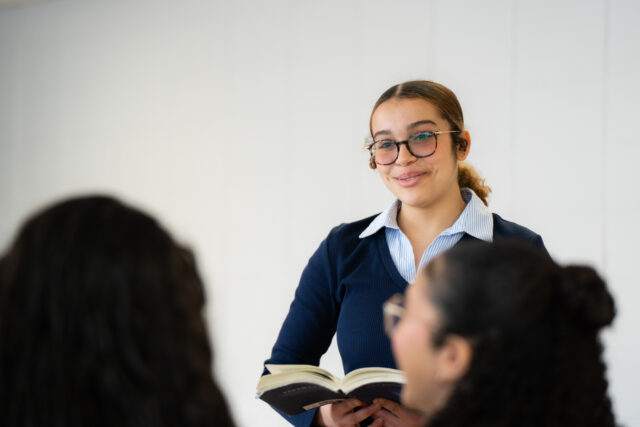
ALC Graduate Profile
Graduates of the St. Lawrence Arts, Literature and Communication will
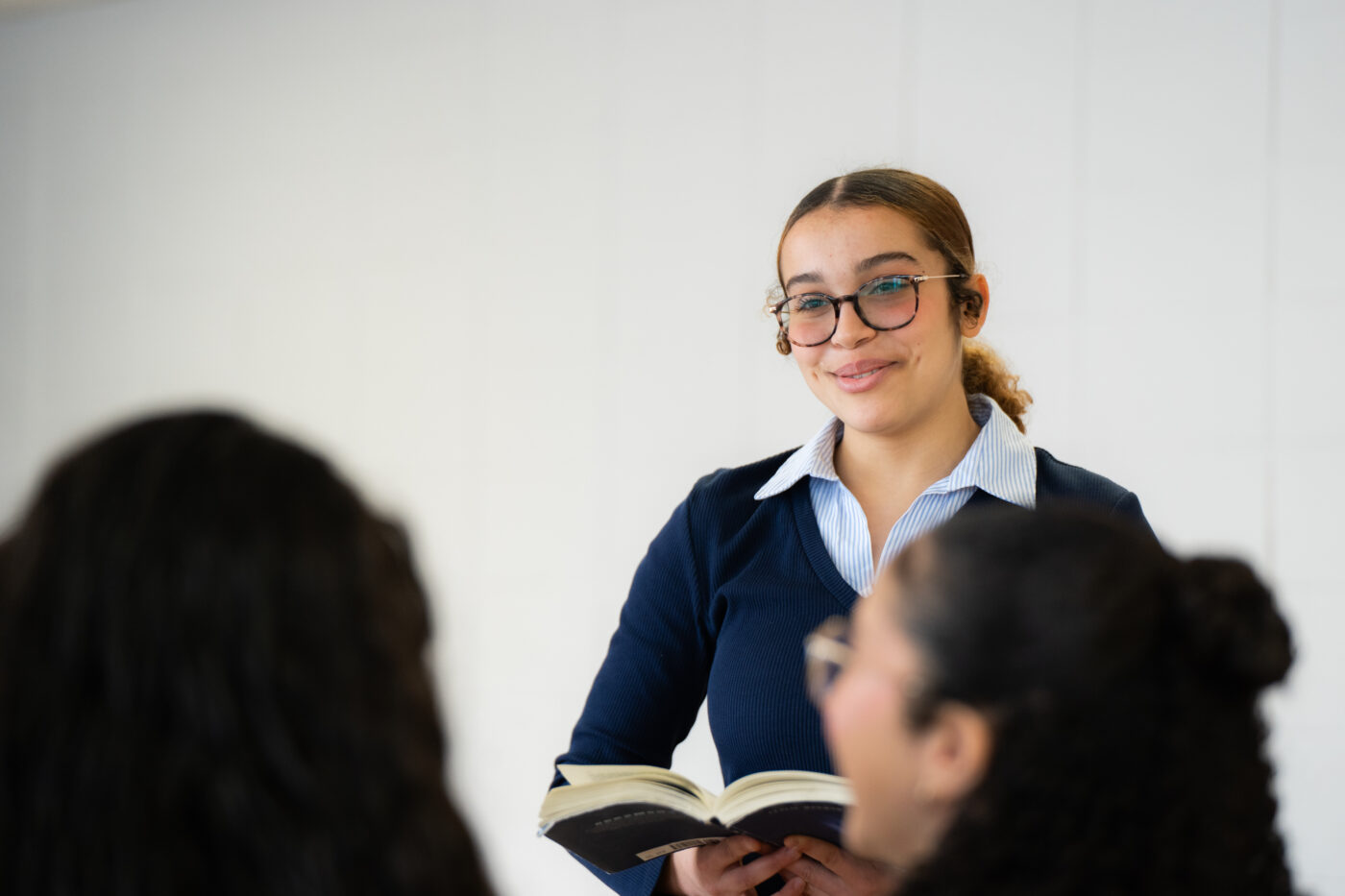

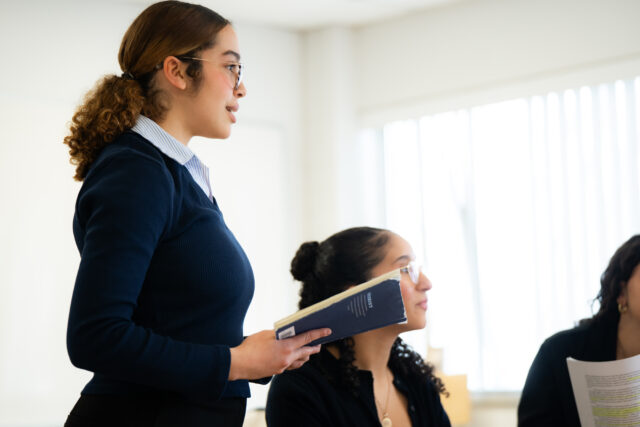
ALC Comprehensive Assessment
The comprehensive assessment will provide students with the opportunity to showcase their mastery of all the competencies outlined in the Arts, Literature and Communication Exit Profile. It will comprise an online portfolio that students will develop throughout their studies in the program. In their final semester, the comprehensive assessment will culminate in projects the students will produce in their Pop Fiction (English), Projet Créatif (French) and Exploring Cultural Diversity (Spanish) courses.
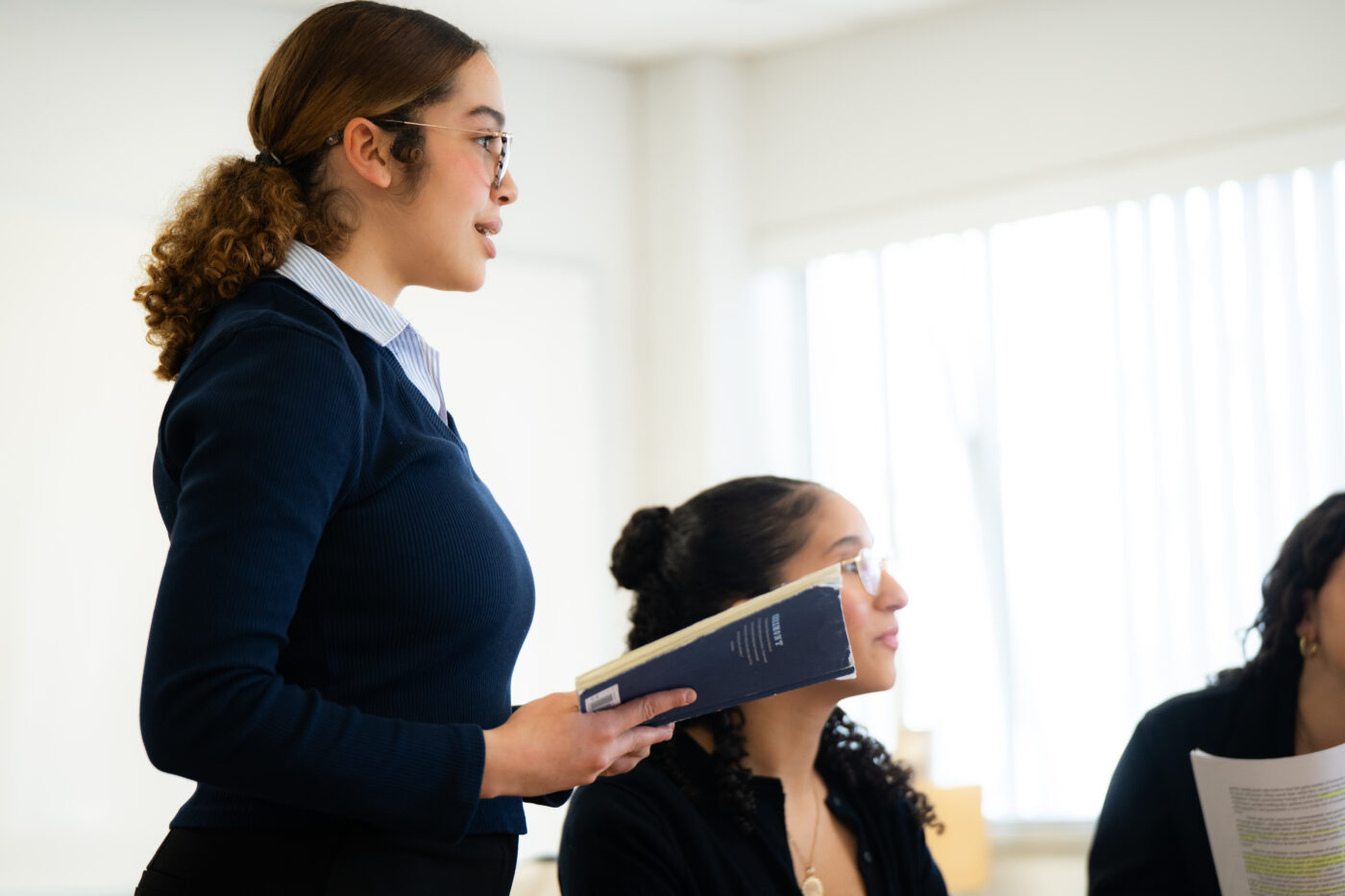

Where Might ALC Lead You?
The DEC in ALC opens the door to further studies in numerous programs such as:
- Education at the elementary or secondary levels
- Teaching English as a Second Language (ESL)
- International relations
- Public relations
- Communication studies
- Journalism and broadcast media
- Law
- Translation
- Creative writing
- Professional writing
- Linguistics and languages
- Literary studies
- English studies
- French studies
- Hispanic studies
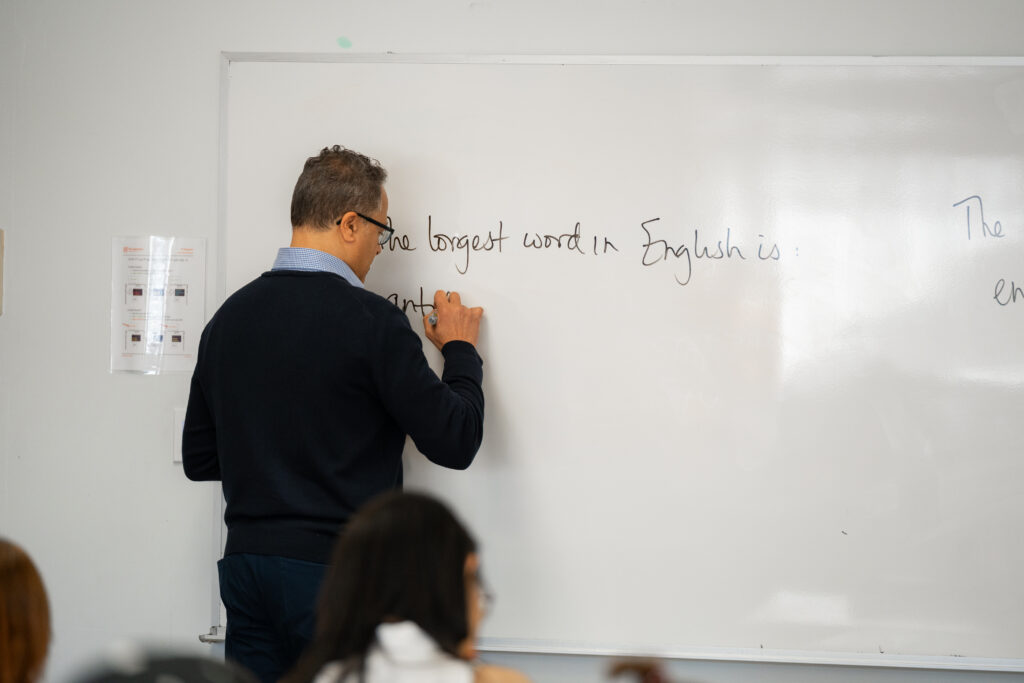
I am so glad to have chosen ALC St. Lawrence! The friendships I’ve formed, the excellence of the teachers, and the wide variety of extracurricular activities have made my time here unforgettable. My program has broadened my perspective on global cultures, helped me master French, English, and Spanish, and taught me invaluable skills in time management and planning. It has also sparked in me a desire to express my creativity. I wholeheartedly recommend studying here for the supportive environment. Teachers are available, kind, and can spend more time one-on-one with students since this is a small college. As a soon-to-be graduate and future law student, I feel fully prepared for the challenges ahead, and I could never thank the college enough for this.
Selena Laflamme
ALC Student
Studying in the ALC program has been an incredible experience. It allowed me to develop my analytical and writing abilities through an exploration of literary genres throughout history. The program’s bilingual approach significantly enhanced my proficiency in both French and English, preparing me to face future academic challenges. Coupled with the guidance of committed and insightful teachers, this experience not only ignited my love for the arts, but it also deepened my understanding of the world through the lens of literature.
Dorothée McMahon
ALC Student
The diverse range of courses in the ALC program allowed me to engage with language both analytically and creatively. The teachers’ feedback and their willingness to answer my many questions were instrumental in my development as a student, which made me feel supported as I transitioned from high school to college. Through the program, I gained a deeper understanding of English, French, and Spanish, which ultimately led me to pursue studies in linguistics as I discovered my passion for the role language plays in shaping our understanding of the world.
Emmy Dumont
ALC Student
The ALC Student Experience
St. Lawrence offers a wide range of opportunities to gain hands-on experience through clubs, events, and activities. The following clubs may be of particular interest to students in the ALC program:
- Arts & Crafting Club
- Bloom Communications
- Fashion Show
- French Cultural Activities
- French Improv Team
- Intercultural Club
- The Lions’ Log (Student Newspaper)
- Multimedia Club
- SLC Radio
- Theatre Troupe
- What the Heck (Band)
All extracurricular activities are open to all St. Lawrence students. Visit the Clubs & Sociocultural Activities page for more information and the complete list of clubs.
